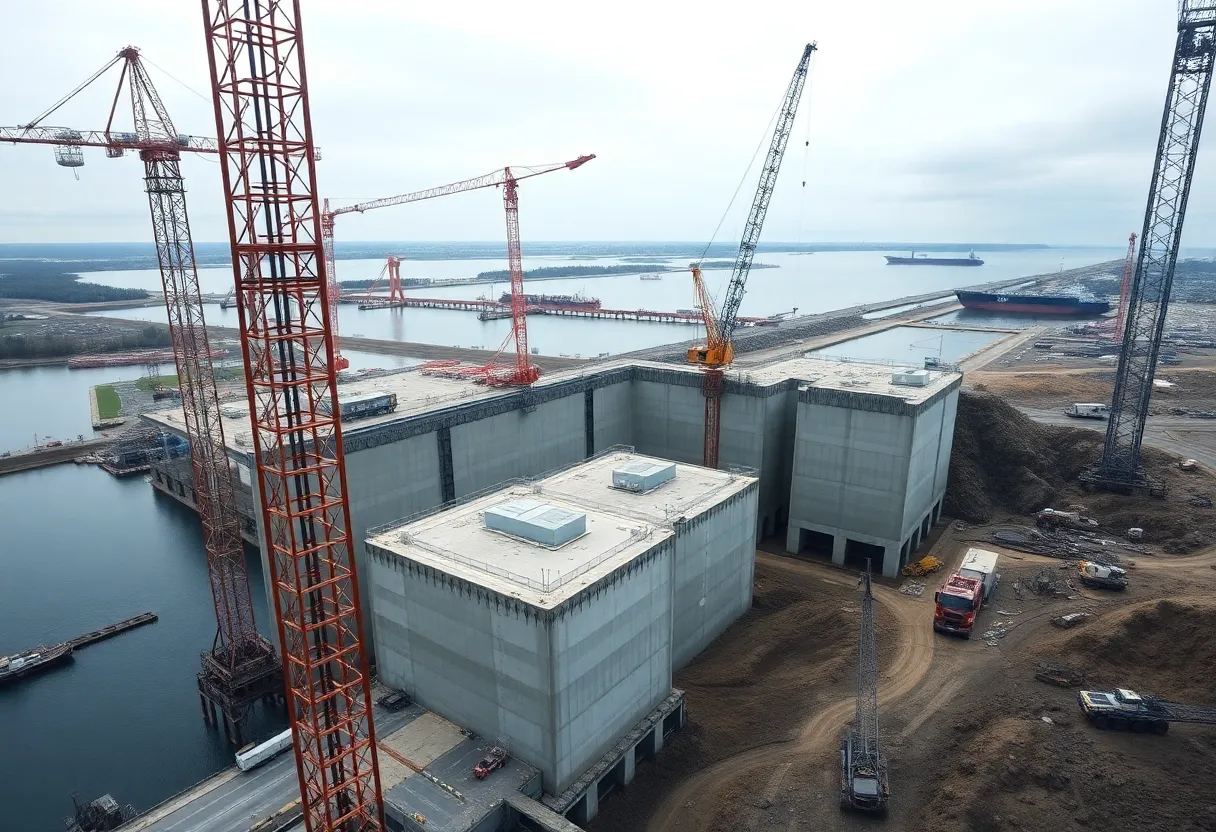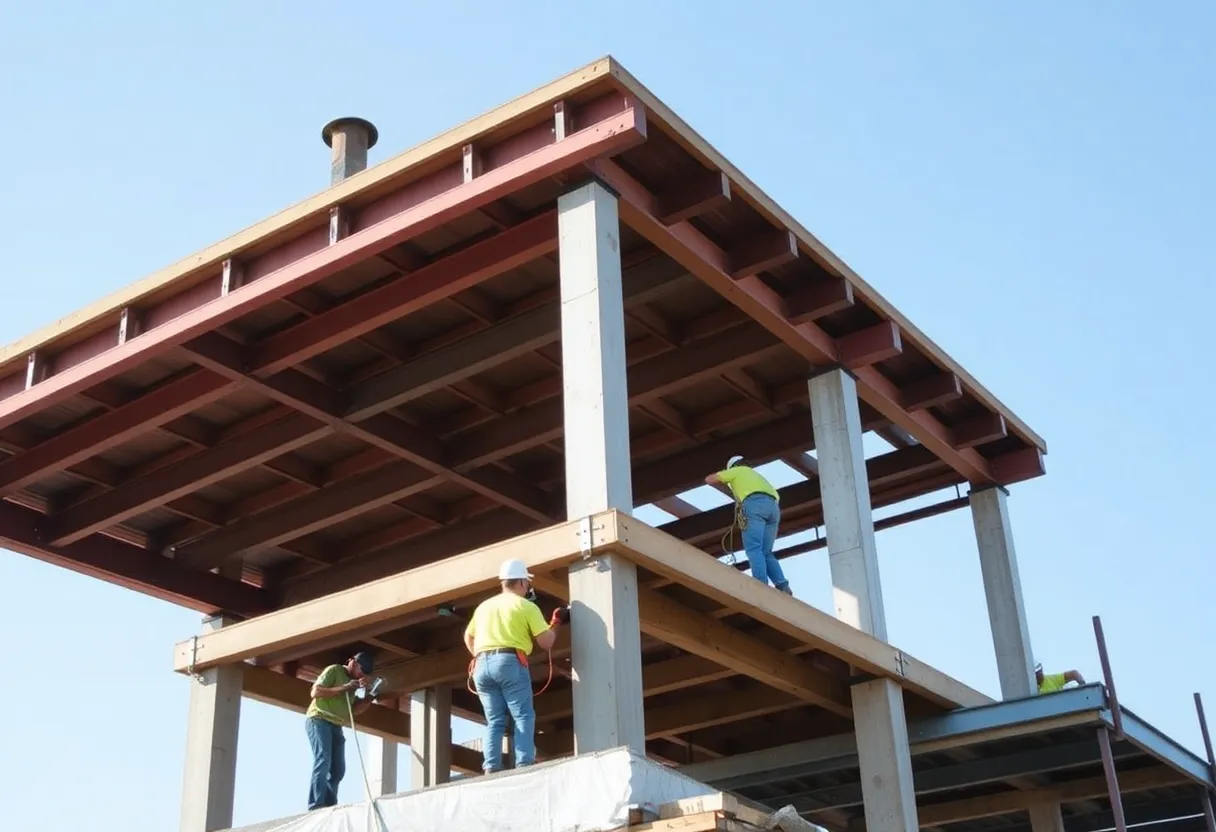Sault Ste. Marie, Michigan, September 15, 2025
News Summary
The U.S. Army Corps of Engineers revised the certified cost estimate for the new Soo Locks large lock from nearly $3.0 billion to about $2.62 billion after awarding all contract options and removing contingency tied to unawarded sub‑phases, trimming roughly $250 million of project risk. Construction remains on track for a scheduled summer completion. Reported federal funding totals vary above $2.2 billion, and managers cite a near‑term need of about $103 million to keep work moving. Phase three work is under way with bedrock excavation, monolith placement and three tall tower cranes on site.
Major update: New Soo Locks cost estimate drops to about $2.62 billion; summer 2030 finish still expected
The U.S. Army Corps of Engineers has revised the certified cost estimate for the new lock at the Soo Locks in Sault Ste. Marie from nearly $3.0 billion down to about $2.62 billion. Officials said the downward revision came after all contract options were awarded, allowing the Corps to remove contingency amounts tied to unawarded sub‑phases and eliminate roughly $250 million of project risk. Construction remains on track for a summer 2030 completion.
Top funding and schedule facts
The project has received substantial federal funding to date, though reports show two different figures for funding already provided: $2.321 billion in one report and $2.231 billion in another. Separate budget actions include a presidential budget proposal for fiscal 2026 that included about $176 million and prior law and budget sources that together contributed hundreds of millions more. Army Corps planners say about $103 million will be needed to keep construction moving during fiscal 2027.
Why the new lock matters
The planned new lock will match the existing large lock at the complex with a chamber about 1,200 feet long and 110 feet wide. That size is needed to handle the largest Great Lakes freighters that now carry the majority of iron ore and other bulk cargo between Lakes Superior and Huron. The locks are a critical link in the U.S. steel supply chain; a prolonged outage of the large lock could have huge economic effects if not prevented or backed up by a second large chamber.
Project phase and recent milestones
The project is in its third phase, focused on building the new lock chamber and rehabilitating downstream approach walls. Earlier phases included deepening the upstream channel to 30 feet and rebuilding upstream approach walls. Work begun in 2020 has advanced steadily: over $543 million to $630 million of work has been reported as completed to date, with two different published totals appearing in project updates. Completed items include downstream approach walls, a new bridge to the power plant, installation of a new pump, demolition of an old lock structure, and filling of another old lock footprint.
How the Corps validated the design
The Corps ran a ship‑simulation study at a test center to virtually navigate the planned lock and check approach‑wall lengths and chamber alignment. The simulation led to design changes: lengthening the north upstream approach wall and adding large timber fenders on the south upstream approach to protect ships and walls. Timber fenders are massive wooden bumpers that reduce rubbing during ship maneuvers.
Construction methods and site features
Contractors have focused on bedrock excavation, using hydraulic breakers and large “hoe rams” to break up rock that will serve as the foundation for lock walls. The walls are being built as a series of giant concrete blocks, called monoliths. A total of 81 monoliths are planned across both sides of the chamber; just over 50 monoliths have been started and one is complete. The concrete mix is unusually stiff and contains heavy 2‑ to 3‑inch aggregate so crews can walk on top of freshly placed material.
Three tall tower cranes have been erected to move materials across the site. Each crane stands about 240 to 270 feet tall, making them among the tallest structures in the region. Crews are also demolishing old concrete monoliths and excavating in the footprint of the former small locks to make room for the new chamber.
Contracting, costs and oversight
The third‑phase construction contract for the new chamber and related work was awarded in a major contract worth about $1.068 billion. After bids closed, industry estimates for final phases came in higher than earlier government projections, prompting the Corps to update its certified cost estimate and to transmit new cost information to congressional authorization committees. Lawmakers and project partners remain focused on managing inflation, labor shortages and supply‑chain pressures that have pushed earlier estimates higher.
Risks and next steps
Project managers highlight that market conditions and the need for continued funding remain key variables. There may be a need for reauthorization or additional appropriations to fully support the remaining work within the updated budget. The agency is working with federal and industry partners to find collaborative solutions and deliver the lock on budget and on schedule.
FAQ
What is the new cost estimate?
The updated certified cost estimate is about $2.62 billion, down from nearly $3.0 billion after contingency reductions tied to awarded contracts.
When will the new lock be finished?
Construction is expected to finish in the summer of 2030, according to the project schedule.
How much federal funding has been provided so far?
Reported totals vary by source: about $2.321 billion in one update and $2.231 billion in another. The Corps continues to track and report funding as work progresses.
What work has been completed?
Completed work includes deepening the upstream channel, approach walls, a new bridge to the power plant, a new pump installation, demolition of an old lock, filling of another lock footprint, and erection of large tower cranes. Cumulative completed work is reported between $543 million and $630 million depending on the update.
Why is a second large lock needed?
A second Poe‑sized lock provides redundancy so the largest freighters can continue moving iron ore and other cargo if the current large lock is unexpectedly unavailable. This protects supply chains and regional industry.
Key project features
| Feature | Detail |
|---|---|
| Certified cost estimate | ~$2.62 billion |
| Projected completion | Summer 2030 |
| Lock size | 1,200 ft long × 110 ft wide |
| Funding to date (reported) | $2.321 billion and $2.231 billion (different updates) |
| Work completed (reported) | $543 million to $630 million (different updates) |
| Phase | Phase 3 — new lock chamber and downstream work |
| Monoliths planned | 81 total; just over 50 started; 1 complete |
| Tower cranes | Three cranes, ~240–270 ft tall |
| Near-term funding need | ~$103 million for FY2027 |
Deeper Dive: News & Info About This Topic
Additional Resources
- The Detroit News — Army Corps: New Soo Locks cost estimate drops (Sep 14, 2025)
- Wikipedia: Soo Locks
- MLive — Soo Locks rebuild project cost balloons (May 2022)
- Google Search: Soo Locks construction project
- SooLeader — Then and now: transformation of the Soo Locks since 2020
- Google Scholar: Soo Locks project
- Detroit Free Press — Soo Locks construction costs and inflation (Jun 2023)
- Encyclopedia Britannica: Soo Locks
- gCaptain — Soo Locks upgrade reauthorized at $3.2B
- Google News: Soo Locks
Author: Construction FL News
The FLORIDA STAFF WRITER represents the experienced team at constructionflnews.com, your go-to source for actionable local news and information in Florida and beyond. Specializing in "news you can use," we cover essential topics like product reviews for personal and business needs, local business directories, politics, real estate trends, neighborhood insights, and state news affecting the area—with deep expertise drawn from years of dedicated reporting and strong community input, including local press releases and business updates. We deliver top reporting on high-value events such as the Florida Build Expo, major infrastructure projects, and advancements in construction technology showcases. Our coverage extends to key organizations like the Associated Builders and Contractors of Florida and the Florida Home Builders Association, plus leading businesses in construction and legal services that power the local economy such as CMiC Global and Shutts & Bowen LLP. As part of the broader network, including constructioncanews.com, constructionnynews.com, and constructiontxnews.com, we provide comprehensive, credible insights into the dynamic construction landscape across multiple states.





